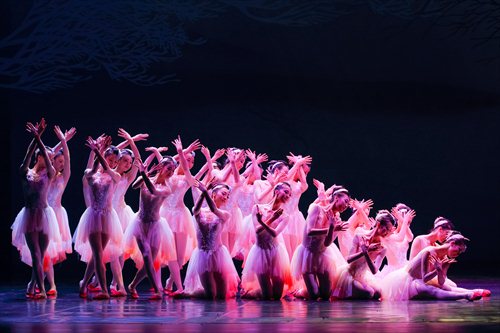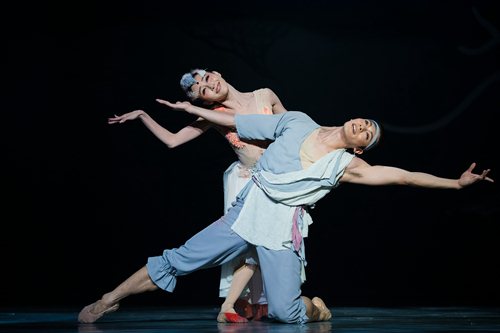From inhabitant to exhibition
Crested Ibis traces the past and future of a graceful creature hardly here anymore
The crested ibis is a large white bird with a bald head showing red skin. It used to be common in East Asia and in Russia, but the last century brought the bird to the brink of extinction. They were previously thought to be extinct in China too, until 1981 when seven ibises were seen in Shaanxi Province.
Outside China, they remain only in Japan and South Korea. In recent years, extensive captive-breeding programs have been developed by Japan and China, with a crested ibis conservation center being built in Shaanxi and on Japan's Sado Island.
The dance drama Crested Ibis was created by Shanghai Dance Theatre and premiered in Japan in October 2014. It focuses on the relationship between humans and this beautiful bird set in three different timelines: in ancient times, when the crested ibis lived in harmony with humans; in the industrial era, as pollution threatens the birds' habitat; and in modern times, when the crested ibis can only be found in the museum.

It stars two lead dancers, Zhu Jiejing, who plays the crested ibis throughout the play, and Wang Jiajun, who plays the woodsman, reporter and museum director.
After nearly 100 successful performances in both China and Japan, a new tour will kick off in April in Shanghai.
Crested Ibis is yet another lead role for Zhu with the company, which she's danced with since she was 16 years old. On a recent visit to their studio, the Global Times caught up with Zhu, who was rehearsing with vigor and coaching other dancers.
"There is a terminology in dancing called battement tendu, which is an alternating, side-to-side movement of the working leg," Zhu told the Global Times.
"I have been doing this every day since I was 9 years old. Quantitative accumulation leads to qualitative transformation, without which you can't achieve the great moment onstage," she said.
"Though it may sound cruel to spend your youth on boring, repetitive practice, I started to enjoy it when I saw dancing as my career."
For Zhu, the crested ibis is a mysterious bird, and this dance interweaves her fate with it. "It is not a normal bird you see on the street. It seems to live in the gray area of our life. I'm glad that I can help promote the idea of protecting this bird to viewers through every performance I do," Zhu said.
Having played the bird about 100 times onstage, Zhu said she still feels pressure before each performance. But what she fears most is not making a mistake, but becoming jaded.
"Every time before I go onstage, I tell myself this is the first time for the audience to buy a ticket and see my performance, and I should take it as my first or my last performance as well," Zhu said.
"The stage is a sacred place for us dancers. You have light, costumes and everybody is working around you. I feel it doesn't do justice to the small space under my feet. I feel a lot of pressure before each performance, even if there is a slight moment of wandering emotion. There is pressure, but at the same time I enjoy the pressure. It's exciting and motivating."

Scenes from the dance drama Crested Ibis Photos: Courtesy of Shanghai Dance Theatre
Other struggles come from the deeper and individual interpretation of the character.
"I think the movements of birds are similar. The problem is how to distinguish my crested ibis from other birds and how to leave my mark on the character. A good example is dancer Yang Liping, who is famous for her peacock dance. With a model like her, I think I still have a lot of room to improve," said Zhu.
Zhu said she's developed deeper feelings toward the character. At the beginning she tried mimicking the bird's movement as precisely as possible.
But slowly, she said, she discovered that it didn't make much of a difference if she wasn't precisely imitating an ibis; what was important is if she could try to feel what the crested ibis felt at that moment: its happiness in the pastoral countryside in ancient times, and its struggle and withering away in modern times, waiting to be awoken in the museum.
"The charm of dancing is that you are not your normal self onstage. The stage has the magic to turn you into any characters you portray. And only when you believe that you are the bird can the viewers believe that you are the bird. If you are only satisfied with mimicking it as close as possible, mimicking movements as it drinks water, you always hold back the threshold of a great performance."
She said a certain talent is required to be a great dancer.
"You need to be a keen observer to everything around you, and heighten your senses. I think when you look at the world with sensitive eyes and enrich the character with the positive energy and beauty that you discovered during the work, you will find dance is not as hard and laborious, and you'll begin to enjoy it," Zhu said.
Date: April 30 to May 1, 7:30 pm
Venue: Majestic Theatre
Address: 66 Jiangning Road
江宁路66号
Admission: 80 yuan ($12.33) to 580 yuan
Call 6217-3311 for details